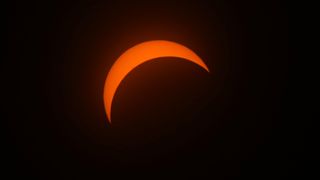From - Live Science
By - Paul Sutter
Editted by - Amal Udawatta

When astronomers combed through an ancient Hindu text known as the Rig Veda, they discovered that it referenced a total solar eclipse that occurred roughly 6,000 years ago — making it the oldest known mention of an eclipse.
The Rig Veda, a collection of sayings and hymns from various religious and philosophical schools, was compiled around 1500 B.C. Like nearly all religious texts, it mentions historical events. Most are contemporary to when it was written, but some stretch back much further. For example, various passages in the Rig Veda mention the location of the rising sun during the vernal equinox. One reference describes the vernal equinox as occurring in Orion, and another has it occurring in the Pleiades.
These descriptions allow astronomers to date those references, because as Earth spins on its axis, it wobbles like a spinning top, changing the relative position of important astronomical events. Currently, the vernal equinox is in the constellation Pisces. It was in Orion around 4500 B.C. and in the Pleiades around 2230 B.C., meaning the Rig Veda recorded some memories of events far earlier than its compilation.
The Rig Veda's language is highly symbolic and allegorical, making it difficult to discern which stories are myths and which are historical. But two astronomers — Mayank Vahia of the Tata Institute of Fundamental Research in Mumbai and Mitsuru Soma of the National Astronomical Observatory of Japan — think they've found references to an ancient eclipse. They reported their findings in the Journal of Astronomical History and Heritage.
The passages are flowery but fitting for an eclipse, describing the sun as being "pierced" with darkness and gloom and proposing that evil beings had caused the sun's "magic arts to vanish." The astronomers noted that these passages do not reference the story of Rahu and Ketu, which is a more recent Hindu mythology surrounding the eclipse, indicating that these passages were described before those stories were created.
Further passages helped the astronomers narrow down the time frame of the solar eclipse. It occurred when the vernal equinox was in Orion, and it also happened just three days prior to an autumnal equinox. It was also a total solar eclipse, and it must have happened over the area where the eventual writers of the Rig Veda lived.
The astronomers found that only two possible dates fit these criteria: Oct. 22, 4202 B.C., and Oct. 19, 3811 B.C. Both of these dates are earlier than the current record holders for the oldest mention of an eclipse — a clay tablet, unearthed in Syria, that recorded an eclipse in either 1375 B.C. or 1223 B.C., and a rock carving in Ireland that might reference an eclipse in 3340 B.C.
The newfound reference in the Rig Veda highlights how total solar eclipses captivated people in antiquity and how ancient texts can contribute to our present-day knowledge of celestial events.
Originally posted on Space.com.
- Get link
- X
- Other Apps
Labels
Astronomy- Get link
- X
- Other Apps
Comments
Post a Comment